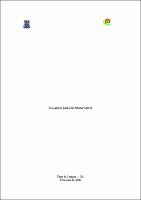| Compartilhamento |


|
Use este identificador para citar ou linkar para este item:
http://tede2.uefs.br:8080/handle/tede/19Registro completo de metadados
| Campo DC | Valor | Idioma |
|---|---|---|
| dc.creator | Fioravanti, Solange Araújo | - |
| dc.creator.Lattes | http://lattes.cnpq.br/8297317787721722 | por |
| dc.contributor.advisor1 | Muniz, Márcio Ricardo Coelho | - |
| dc.contributor.advisor1Lattes | http://lattes.cnpq.br/5217977951806599 | por |
| dc.date.accessioned | 2015-07-15T13:31:34Z | - |
| dc.date.available | 2008-07-29 | - |
| dc.date.issued | 2008-02-29 | - |
| dc.identifier.citation | FIORAVANTI, Solange Araújo. PERCURSOS DO TRÁGICO NOS CONTOS DE MIGUEL TORGA. 2008. 155 f. Dissertação (Mestrado em Literatura e Cultura) - UNIVERSIDADE ESTADUAL DE FEIRA DE SANTANA, Feira de Santana, 2008. | por |
| dc.identifier.uri | http://localhost:8080/tede/handle/tede/19 | - |
| dc.description.resumo | Miguel Torga, pseudônimo literário do médico português Adolfo Correia da Rocha (1907-1995), destaca-se, segundo a crítica, por possuir um talento multímodo enquanto escritor. O presente trabalho que tem como título Percursos do trágico nos contos de Miguel Torga, no qual se pretende apontar e discutir o trágico como elemento central em cinco contos torguianos: Madalena, do livro Bichos; A Maria Lionça, de Contos da montanha; O Alma-Grande, O Milagre e O Leproso, de Novos contos da montanha, utilizando-se do viés comparatista, da pesquisa bibliográfica, do método dedutivo e da análise literária. Para desenvolver estas leituras, foram utilizadas teorias de Edgar Allan Poe, André Jolles, Raimundo Magalhães Júnior, Hermann Lima, Júlio Córtazar, Nádia Gotlib, Massaud Moisés, Ricardo Piglia, António Manuel Ferreira, entre outros, que oferecem subsídios para a história e análise do conto enquanto forma compacta, concisa, com identidade própria e bem definida. Por outro lado, nas discussões acerca do trágico, objetivou-se travar um diálogo entre o trágico tradicional e o trágico moderno nos cinco contos elencados. Para tanto, foram utilizados, além da fortuna crítica do escritor, estudos de Aristóteles, Kitto, Albin Lesky, Nietzsche, Jean-Pierre Vernant, Vidal-Naquet, Emil Staiger, Northrop Frye, Junito de Souza Brandão, Raymond Williams, Rachel Gazolla, Lígia Militz da Costa, Maria Luiza Ritzel Remédios, entre outros. Enfim, intenta-se com este trabalho oferecer uma contribuição para ampliar, ainda mais, a leitura e o conhecimento da produção contística de Miguel Torga no panorama da literatura portuguesa. | por |
| dc.description.abstract | Miguel Torga, the Portuguese doctor's literary pseudonym Adolfo Correia da Rocha (1907-1995), he stands out, according to the critic, for possessing a talent varied while writer. The present work that has as title Tragic Paths in Miguel Torga's Stories (Percursos do trágico nos contos de Miguel Torga) in which it intends to point and to discuss the tragic as central element in five short stories by Torga: Madalena, of the book Bugs (Bichos); Maria Lionça (A Maria Lionça), of Mountaint Short Stories (Contos da montanha); The Big-Soul (O Alma-Grande), The Miracle (O Milagre) and The Leper (O Leproso), of New Mountain Short Stories (Novos contos da montanha), being used of the comparative inclination, of the bibliographical research, of the deductive method and of the literary analysis. To develop these readings, theories were used of Edgar Allan Poe, André Jolles, Raimundo Magalhães Júnior, Hermann Lima, Júlio Córtazar, Nádia Gotlib, Massaud Moisés, Ricardo Piglia, António Manuel Ferreira, among others, that offer subsidies for the history and analysis of the short stories while it forms it compacts, concise, with own and very defined identity. On the other hand, in the discussions concerning the tragic, it is objectified to join a dialogue among the tragic traditional and the tragic modern in the five stories selected. For so much, they were used, besides the writer's critical fortune, studies of Aristotle, Kitto, Albin Lesky, Nietzsche, Jean-Pierre Vernant, Vidal-Naquet, Emil Staiger, Northrop Frye, Junito de Souza Brandão, Raymond Williams, Rachel Gazolla, Lígia Militz da Costa, Maria Luiza Ritzel Remédios, among others. Finally, it is attempted with this work to offer a contribution to enlarge, still plus, the reading and the knowledge of Miguel Torga's short story production in the panorama of the Portuguese literature. | eng |
| dc.description.provenance | Made available in DSpace on 2015-07-15T13:31:34Z (GMT). No. of bitstreams: 1 Solange.pdf: 627036 bytes, checksum: 483914c1983e9393bfca9c1e5dd11a2a (MD5) Previous issue date: 2008-02-29 | eng |
| dc.description.sponsorship | - | |
| dc.format | application/pdf | por |
| dc.thumbnail.url | http://tede2.uefs.br:8080/retrieve/4349/Solange.pdf.jpg | * |
| dc.language | por | por |
| dc.publisher | UNIVERSIDADE ESTADUAL DE FEIRA DE SANTANA | por |
| dc.publisher.department | Literatura e Cultura | por |
| dc.publisher.country | BR | por |
| dc.publisher.initials | UEFS | por |
| dc.publisher.program | Programa de Pós-Graduação em Literatura e Diversidade Cultural | por |
| dc.rights | Acesso Aberto | por |
| dc.subject | Literatura Portuguesa | por |
| dc.subject | Miguel Torga | por |
| dc.subject | Conto | por |
| dc.subject | Tragédia. | por |
| dc.subject | Portuguese Literature | eng |
| dc.subject | Miguel Torga | eng |
| dc.subject | Short Story | eng |
| dc.subject | Tragedy | eng |
| dc.subject.cnpq | CNPQ::LINGUISTICA, LETRAS E ARTES::LETRAS::LITERATURA BRASILEIRA | por |
| dc.title | PERCURSOS DO TRÁGICO NOS CONTOS DE MIGUEL TORGA | por |
| dc.type | Dissertação | por |
| Aparece nas coleções: | Coleção UEFS | |
Arquivos associados a este item:
| Arquivo | Descrição | Tamanho | Formato | |
|---|---|---|---|---|
| Solange.pdf | 612,34 kB | Adobe PDF |  Baixar/Abrir Pré-Visualizar |
Os itens no repositório estão protegidos por copyright, com todos os direitos reservados, salvo quando é indicado o contrário.




